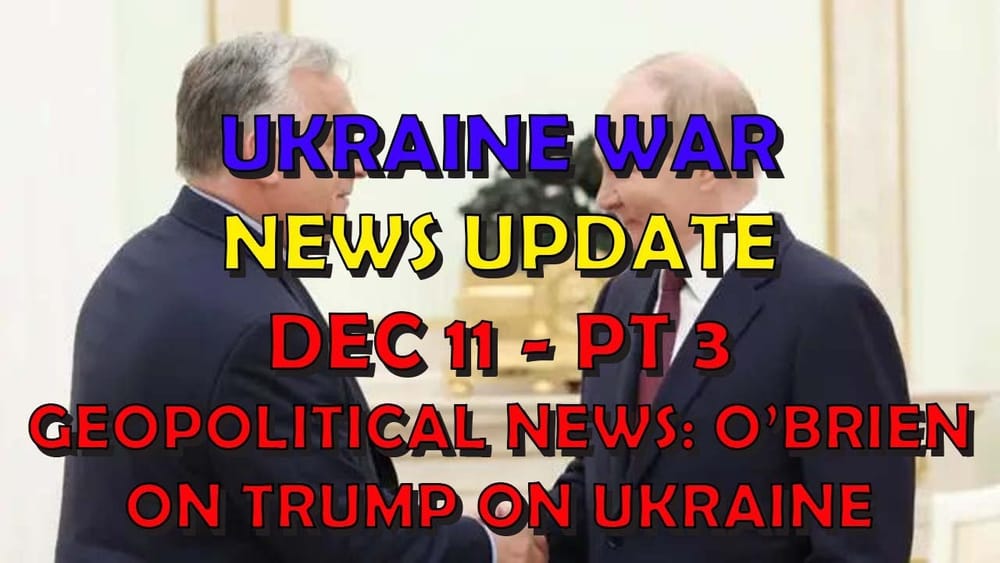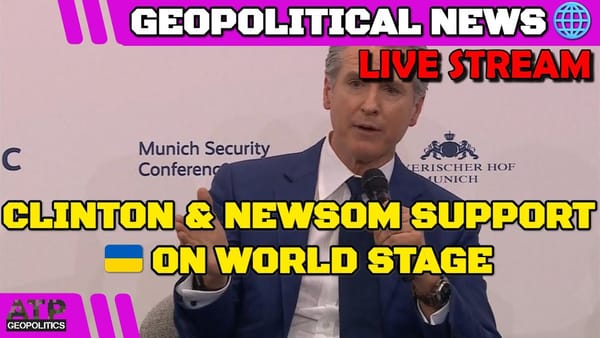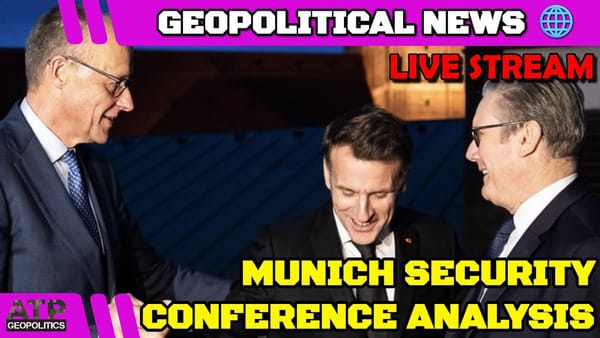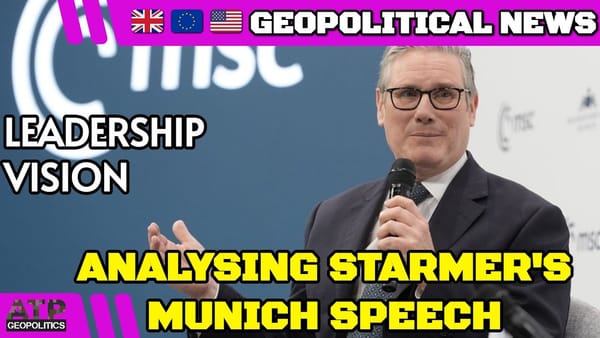Ukraine War Update BUMPER NEWS: Geopolitical News
Table of Contents 📖
Hello Team
🎦 00:00-00:11⏩
- Jonathan introduces the video as the third part of the Ukraine War news update for the 11th of December.
- Indicates that the video will cover Geopolitical News.
Ukrainian delegation to visit Germany
🎦 00:11-00:22⏩
- Prime Minister Denys Shmyhal and a Ukrainian delegation are to visit Germany.
- They will have a meeting with Chancellor Olaf Scholz and Vice-Chancellor Habeck.
- Friedrich Merz, the opposition leader for the CDU, recently visited Kyiv and discussed Taurus missiles.
- Jonathan speculates whether leverage could be applied to Scholz regarding the supply of Taurus missiles to Ukraine, by suggesting that Merz may agree to supply them if he becomes Chancellor.
Bulgaria may halt transit of Russian gas
🎦 00:22-00:26⏩
- Bulgaria may halt the transit of Russian natural gas to Central Europe if Gazprom doesn't find a payment solution amid US sanctions.
- According to Bloomberg, Bolgar Transgas will strictly fulfill its contract and won't allow the transit of gas if the service hasn't been paid for.
Russian Ruble in trouble
🎦 00:26-02:06⏩
- The Russian Ruble is "tanking" again, having lost 6% of its value this week.
- Jonathan notes that the Ruble was taken off foreign exchanges and appeared to stabilise, but it seems to be "tanking" again.
- Jonathan considers this to be good news for Ukraine.
Orban meets with Putin
🎦 02:06-02:40⏩
- Hungarian Prime Minister Viktor Orban held an hour-long conversation with Vladimir Putin.
- Orban declared the "most dangerous weeks of the Russian Ukrainian war" and talked about taking all possible diplomatic steps in favor of a ceasefire and peace talks.
- Jonathan notes that Orban's idea of a ceasefire and peace talks are ways of allowing Russia to gain maximally from the situation.
Macron discusses peacekeeping mission in Ukraine
🎦 02:40-03:04⏩
- Macron has arrived in Poland to discuss a joint peacekeeping mission in Ukraine.
- The plan is based on the Korean scenario (North-South Korea), according to which a foreign peacekeeping contingent is introduced through the line of contact.
- It could consist of five brigades, about 40,000 soldiers.
Peacekeeping mission very expensive
🎦 03:04-03:45⏩
- Jonathan points out that a peacekeeping mission is actually very expensive and is not a cheap option.
- It is cheaper to keep supporting Ukraine with weapons and assistance.
- The brigade that Germany is sending to Lithuania is costing billions a year.
Korean solution for Ukraine discussed
🎦 03:45-04:31⏩
- Edward Hunter Christie discusses a Korean solution for Ukraine with European troops in an article.
- Poland's main newspaper of record, RP, reports on Macron's visit to Warsaw and current discussions on a plan to deploy 40,000 European troops to Ukraine following an assumed ceasefire.
- Eli Tenenbaum of the French think tank IFRI is named as "working on a project".
- Tenenbaum was also quoted recently in Ukrainian media on the same topic.
- RP notes US and German opposition to NATO membership and challenges with arms supplies, hence from three competing models:
- 1
- 2
- 3
- The Korean model is the main idea.
Concerns about a peacekeeping mission
🎦 04:31-05:14⏩
- Christie comments that the vision remains problematic because there is a suggestion that the troops would be peacekeepers and no clarity as to their equipment, rules of engagement, and crucially as to the level of political commitment.
- The Korean model is based on having a mutual defense treaty between the U.S. and Korea. The U.S. would go to war against DPRK (North Korea) if the DPRK attacks.
- The U.S. has for decades deployed sizeable and very well-equipped forces to Korea.
- It has to be clear to Moscow that if it attacks Ukraine again, whether on land or from the air or from the sea, then it faces war with major European states, at a minimum a war over Ukraine, but a wider one if Moscow escalates.
- Otherwise, the Korean model doesn't work.
Peacekeeping troops need clear mandate
🎦 05:14-05:31⏩
- Jonathan reiterates that it is easy to suggest sending peacekeeping troops, but if they get engaged, it should be a sort of Article 5 NATO but in a kind of bilateral sense - i.e. war with that nation or those nations.
- That is how the Korean model works.
Requirements for European troops in Ukraine
🎦 05:31-06:30⏩
- Christie expresses concern at how discreetly and timidly European policymakers seem to be moving around the issue.
- For a peacekeeping mission to work, European troops in Ukraine must be heavily equipped, combat-ready, and integrated with the Ukrainian Armed Forces into common defence plans - basically an alliance structure.
- It wouldn't be NATO, but it would be in the spirit of NATO or the US Republic of Korea arrangements.
- Large combined exercises should be run between European forces and Ukrainian forces within Ukraine, and also crossing over from NATO territory into Ukrainian territory. In other words, it would look functionally like NATO.
- Elements of the Israeli model must also unconditionally be part of the solution.
- It is in the supreme interest of Europeans to ensure Ukraine arms itself with a full range of weaponry and at scale. The economic aspects can be bargained over, not the military effectiveness.
Ukraine's contribution to European security
🎦 06:30-07:03⏩
- Christie does not see an acknowledgement in current discussions of Ukraine's positive contribution to European security.
- Ukraine knows how to fight the Russians, not in theory, but in practice.
- Ukraine's combat experience is uniquely valuable and precious for European security.
- It is of rational interest to European states, from Poland to France, Germany to the UK, to nurture, respect and work with Ukraine's prowess and experience.
Learning from Magyar's Birds
🎦 07:03-07:54⏩
- Jonathan previously discussed how Magyar's Birds (the elite drone operators) are being expanded threefold.
- Jonathan argues that there are no better drone operators and no better set of people with an understanding of how drones integrate with other forces on the battlefield than Magyar's Birds.
- Jonathan suggests that European nations need to be learning from Magyar's Birds and have an understanding that Ukraine is valuable and precious to European (and US) security.
- Jonathan speculates that if the US steps back, Ukraine might decide to share their expertise with the Europeans and not so much with the US, potentially downgrading US capabilities.
Problems with Russia keeping territory
🎦 07:54-08:19⏩
- Letting Russia get away with more territory than it held in January 2022 is an enormous problem.
- In the heads of Putin and Russian nationalists, this will count as a victory and it will be emboldening.
- One aspect of the Korean or indeed West German models that cannot be accepted is the ultimate diplomatic recognition of illegal conquest.
No recognition of territorial expansion through aggression
🎦 08:19-08:51⏩
- While Western governments recognised North Korea and the GDR, had diplomatic relations with them, and accepted them into the UN, there has never been any acceptance of territorial expansion gained through aggression since the 1940s.
- The signal sent to Moscow and others by allowing territorial expansion through aggression would be catastrophic.
- There should be no doubt that Russia keeping the land bridge from Donbas to Crimea is unacceptable.
Comparison to domestic law
🎦 08:51-09:26⏩
- Jonathan compares the situation to domestic law, stating that a powerful local gang would not be allowed to take over someone's house and keep half of it because they are strong.
- Jonathan questions why this would be allowed in international scenarios, calling it "mind-boggling".
Ukraine must be enabled to seek reconquest
🎦 09:26-09:49⏩
- Ukraine must be enabled and empowered to seek the reconquest of its territories.
- Jonathan's fear is that any deal with Moscow would rule that out.
- There is no existing model that would allow for Europeans to protect unoccupied Ukraine and help Ukraine's reconquest.
- Jonathan does not know how Ukraine could get its territory back diplomatically, as Russia would just say no.
Extended deterrence and nuclear weapons
🎦 09:49-10:17⏩
- Another question concerns extended deterrence. If there is a serious intention to protect unoccupied Ukraine, what are the war plans in case Russia tries once again to march on Kyiv?
- The Korean model implies the option of using nuclear weapons. That too would be needed for Ukraine.
- This brings Christie back to the position that Ukraine should acquire nuclear weapons. That's the best guarantee that will keep Moscow at bay even in case other European states fail to answer the call.
Dangers of Russia keeping the land bridge
🎦 10:17-10:43⏩
- If the war stops with Russia keeping the land bridge, Europe will face a battle-hardened Russian army and a Russian war economy running on high velocity.
- It is not hard to imagine an emboldened Putin sensing fear and reluctance in Europe trying his hand at creating another land bridge, namely from Belarus to Kaliningrad, or committing some other aggression designed to buttress the new Russian Empire's position.
The best outcome is for Russia to lose
🎦 10:43-10:57⏩
- It remains the case that the best outcome is to make Russia lose.
- In spite of the grinding advance in eastern Ukraine, Russia has lost many men, much equipment, and its economy is heavily distorted.
- Much more can be done if Ukraine is fully armed to raise the chances of Russia breaking.
- The current flurry of diplomacy around Ukraine comes neither from Moscow nor from Kyiv. It comes purely from the West, and from the United States in Jonathan's opinion.
- It comes from supposed fatigue and cynicism relating to war in which the West does not have a single soldier.
Strategic defeat for the West
🎦 10:57-11:26⏩
- Worse than territorial defeat for Ukraine, the West is edging towards chosen strategic defeat, without having fired a single shot because they are so afraid of ever having to fire a single shot.
- That trajectory will not make Europe free, nor give peace.
- Jonathan suggests that in America, the situation is all about the Trump administration, and as will be seen in a second, it's not looking great.
Protests in Georgia
🎦 11:26-11:44⏩
- Protests are still being seen on the streets in Georgia.
- Jonathan hasn't seen as much on social media as initially but hopes that's just because of a bit of normalization.
- Jonathan emphasises that the protestors need to continue despite the cold, miserable, and dangerous conditions.
Importance of Georgian protests
🎦 11:44-12:07⏩
- Jonathan emphasises that for the protestors' own freedom and democracy, they need to win that battle.
- For the defense of democracy not only in Europe but in the wider region and the world, that battle needs to be won by the people of Georgia.
Russian influence in Romania
🎦 12:07-12:31⏩
- Darroch Canis states that in the past few days, it's become increasingly clear that what Russia attempted to do in Romania through Canon Georgescu enjoyed some level of support from a faction within Romania's secret services, as well as from certain right-wing elements within the Romanian Orthodox Church and the PSD, the senior partner in the current ruling coalition.
- Jonathan suggests that in Georgia, some of the internal security services are likely to be right-wing, ultra-nationalist people who would be in favour of what Russia is trying to do in Georgia.
Pro-Western elements still fighting in Romania
🎦 12:31-13:21⏩
- In Romania, where there is a better-functioning democracy, there are elements in the secret services, internal security services, and in government who are broadly in favor of the Russian "Ruski Mir" (Russian world).
- While the pro-Western elements within Romania's security apparatus, political elite, and society as a whole may have won the first battle, the war is unfortunately far from over.
- Jonathan sees this as a warning shot for those in the West who think that what happened in Romania was just a flash in the pan.
Situation in Abkhazia
🎦 13:21-14:21⏩
- The Parliament of the Occupied Republic of Abkhazia (a breakaway/annexed area of Georgia) recently rejected a law that allowed Russian interests to buy up land in Abkhazia more easily.
- As a result, the leader of Abkhazia resigned.
- Jonathan notes that this wasn't so much anti-Russian sentiment as anti that particular Russian law.
- Broadly speaking, there appears to still be some support for the Russians in that area, locally speaking.
Observations about Abkhazian protestors
🎦 14:21-14:48⏩
- Jonathan observes that many of the protestors in Abkhazia are women, unlike protests in other places like Syria, where 95% were men.
- He also comments on the lack of colour in their clothing, with everyone wearing dark blue or black coats, describing it as "dour".
Energy blackmail in Abkhazia
🎦 14:48-15:22⏩
- Following the rejection of the investment agreement with Russia, Abkhazia has experienced electricity cut-offs, leaving residents with only one or two hours of power per day.
- The source suggests this is a traditional Russian pastime of blackmailing the civilian population over energy supplies, and that Putin will resort to forcing people to make concessions by threatening to cut off power to hospitals.
- Jonathan questions whether this is a correct interpretation of what is going on.
Differing interpretations of events in Abkhazia
🎦 15:22-15:47⏩
- The Kyiv Independent reports that Abkhazia's local council voted against a controversial investment agreement with Russia.
- Jonathan presents two options: either Russia cut money to Abkhazia out of retribution, or Russia is short on money because its economy is tanking.
- Jonathan does not know what the reality is but hopes that issues like this result in a groundswell of discontent with Russia and a move to throw off the yoke of Russian suppression, as is being seen in the rest of Georgia.
Russian military trapped in Syria
🎦 15:47-16:58⏩
- Anton Gershenko reports that Russian Z-blogger Anastasia Kashcheva-Varova writes that Putin saved his friend Assad but effectively abandoned his military, which is trapped and could now become a bargaining chip in negotiations.
- Jonathan summarises Kashcheva-Varova's Telegram post, highlighting that Russian military bases in Syria, Libya, and Africa are blocked, with transportation routes cut off.
- Jonathan previously covered this in detail earlier in the day.
Recap of Russian Z-blogger's post
🎦 16:58-18:40⏩
- Jonathan goes through the post by Russian Z-blogger Anastasia Kashcheva-Varova.
- Key points include:
- Russian military bases in Syria, Libya, and Africa are blocked.
- Transportation routes are cut off.
- Khmeimim airbase is surrounded.
- Tartus naval base is abandoned.
- The question of how to get stranded military personnel out is being considered.
- Losing Syria as a transportation hub means losing access to Africa.
- Russia's withdrawal from Syria would allow Turkey to become a player in the European energy market.
- Russian bases could be used to induce Russia to make peace on terms acceptable to Ukraine and the U.S.
- The blogger expresses frustration that Russia spits on all agreements, including the Minsk agreements.
- Jonathan finds it amusing that a Russian is making this last point.
Russian Ruble losing value
🎦 18:40-18:57⏩
- The Russian Ruble has lost 6% of its value in the past three hours (between 10am and 1pm Moscow time).
- Jonathan states that this is not sustainable.
Jason J. Smart on Russia's situation
🎦 18:57-19:08⏩
- Jason J. Smart claims that Russia cannot win in Ukraine nor back Assad.
- He states that the Russian military is not sustainable and that Russia will collapse.
- Jonathan describes these as "big, big claims".
China's military exercises around Taiwan
🎦 19:08-19:57⏩
- China is conducting the largest military exercise around Taiwan since 1996.
- The People's Liberation Army (PLA) is practicing a blockade of Taiwan and setting up a naval war to blockade any foreign military help that could come from the US and Japan.
- The PLA is de facto blockading much of the first island chain from Japan to the Philippines.
- Jonathan describes this as "scary stuff" for the Taiwanese.
US considering new sanctions on Russian oil trade
🎦 19:57-20:26⏩
- The Biden administration is weighing new, harsher sanctions against Russia's lucrative oil trade, seeking to tighten the squeeze on the Kremlin's war machine just before Donald Trump returns to the White House, according to Bloomberg.
- Jonathan hopes that the US Treasury goes to town on the Kremlin and that Trump lets those sanctions play out.
- Jonathan believes this is the most important thing to happen with the Trump administration coming in.
Targeting Russia's shadow tanker fleet
🎦 20:26-20:42⏩
- New US sanctions would also target Russia's shadow tanker fleet, which the UK has been big on targeting.
- Jonathan quotes the headline "Biden looks for ways to sap the Kremlin's war machine in Ukraine" and exclaims "Abso-bloody-lutely".
Mitch McConnell interview
🎦 20:42-21:15⏩
- Jonathan discusses a Financial Times piece on Mitch McConnell, describing him as "the great turtle in power".
- Although McConnell and Trump don't see eye to eye, and McConnell reportedly can't bring himself to use Trump's name, Jonathan believes McConnell is almost solely responsible for Trump's current position.
- Jonathan clarifies that McConnell is not solely responsible, but massively responsible for where the Republican Party is at the moment.
- However, McConnell is also kind of consistently right on Ukraine in a way that the MAGA Republicans are not.
- The article is titled "Mitch McConnell, we're in a very, very dangerous world right now." It discusses McConnell's plans to spend the last two years of his term fighting back against an increasingly isolationist GOP.
McConnell's position and relationship with Trump
🎦 21:15-21:46⏩
- McConnell is in an interesting position because it's well known that he doesn't see eye to eye with Trump.
- Trump has insulted McConnell's wife, and McConnell was very open about his thoughts just after January 6th.
- Now, Trump is likely to pardon the January 6th insurrectionists.
- McConnell could be a thorn in Trump's side, especially if he feels strongly about issues like Ukraine.
Mitch McConnell: A pivotal politician
🎦 21:46-22:22⏩
- Jonathan provides a brief introduction to Mitch McConnell for those who may not be familiar with him.
- McConnell has earned power and used it to shift the country to the right during his 17-year tenure as a majority and minority speaker for the Senate for the GOP.
- He has won races across the country, raised more than a billion dollars to boost his colleagues, and negotiated trillion-dollar-plus bills, including aid that lifted the country out of the pandemic.
- He has become enormously influential and broadly unpopular, making enemies among Democrats for blocking judicial nominations to the Supreme Court and among Republicans for his occasional sharp criticisms of Donald Trump.
McConnell's warning about a dangerous world
🎦 22:22-23:03⏩
- With Trump preparing to return to the White House, McConnell issues a warning, stating, "We're in a very, very dangerous world right now," reminiscent of before World War II.
- He notes that even the slogan is the same: "America First," which was used in the 1930s.
Connection between the right wing and authoritarianism
🎦 23:03-23:53⏩
- Jonathan references his interview with author Holburn in Monday's podcast episode, where they discuss the connection between the American right wing (or the right wing in general) and the kind of authoritarian autocracy breaking out across the world.
- Jonathan suggests that this connection is not as surprising as one might think and that Reagan Republicanism is not necessarily representative of the right wing.
- He encourages listeners to look back at the America First movement in the 1930s, which was pro-Hitler, pro-isolationism, and opposed to helping Europe.
- Jonathan points out that despite Churchill's efforts to get the U.S. involved in World War II, it wasn't until Pearl Harbor that the U.S. entered the war, due to a deep-seated feeling that is being repeated in 2024.
McConnell vs. Trump on Ukraine
🎦 23:53-24:52⏩
- McConnell's words are targeted directly at Trump and Vice President-elect J.D. Vance, who have argued that the US should not be spending any more money on Ukraine.
- McConnell is a strong believer in the Ronald Reagan view of the US role in the world, rather than the Trump one.
- Jonathan expresses interest in hearing from Republicans about their views on this.
McConnell disagrees with Trump's "enemy within" rhetoric
🎦 24:52-25:27⏩
- Trump has said that enemies within the US are more dangerous than Russia and China.
- McConnell disagrees with this statement.
McConnell voted for Trump, won't criticise him
🎦 25:27-26:36⏩
- McConnell acknowledges for the first time that he voted for Trump last month, although he can't bring himself to mention Trump's name.
- When asked if he wishes he had done more to prevent Trump from becoming president again, McConnell says, "The election's over and we're moving on."
- Jonathan interprets this as McConnell refusing to answer the question but implying that readers can read between the lines.
Trump's meeting with Zelensky and Macron in Paris
🎦 26:36-27:13⏩
- According to Reuters, Trump behaved in a friendly, respectful, and open manner and appeared to be in listening mode during his meeting with Ukrainian President Zelensky and French President Macron in Paris.
- Trump repeatedly stated that he wants an immediate ceasefire and negotiations between Russia and Ukraine.
- Jonathan notes that Trump's default position is an immediate ceasefire, regardless of the situation.
Phillips O'Brien on Trump's stance on Ukraine
🎦 27:13-27:56⏩
- Jonathan discusses a piece by Phillips O'Brien, an author, historian, and strategist, about Trump's stance on Ukraine.
- Jonathan is interested in the reaction of people on social media who are overtly pro-Trump but also pro-Ukraine, as he doesn't believe those two positions are easily compatible.
- O'Brien argues that Trump is doing everything possible to shore up Russia and telegraph that Ukraine aid is being cut.
- O'Brien believes that people are deluding themselves if they think Trump is softening on Ukraine.
Trump's Truth Social post on Bidenomics
🎦 27:56-28:35⏩
- O'Brien points to a recent Truth Social post by Trump as evidence of his stance on Ukraine.
- In the post, Trump criticises "Bidenomics" by suggesting a conspiracy theory where Americans pay taxes, the money is sent to Ukraine, then sent back to Hunter Biden, who gives it to Joe Biden, who then pardons Hunter.
- Jonathan interprets this as showing contempt for Ukraine, despite Trump's recent meeting with Zelensky in Paris.
O'Brien: Don't be fooled by Trump's words on Ukraine
🎦 28:35-28:56⏩




